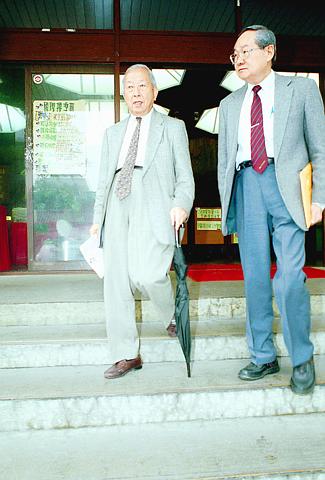Twenty-three founding members of the Taiwan Independence Party (TAIP) quit the party yesterday to support President elect Chen Shui-bian (
Speaking on behalf of the group, former TAIP chairman Lee Chen-yuan (
"Chen won the presidential election. The TAIP has finished its historical mission. It is not necessary to stay in a withering party and dissipate the power for Taiwan's solidarity," Lee told a news conference.

PHOTO: GEORGE TSORNG, TAIPEI TIMES
Lee Sheng-hsiung (
"While we hope to disband the TAIP, we still respect the other party members who disagree with this," he said, adding that Lee Chen-yuan had already brought up the question of the party's future before the election.
The TAIP also nominated its current chairman, Cheng Bang-chen (
While leaving the TAIP, both Lees said there was no need to join the DPP, though they would cooperate with the party.
Lee Chen-yuan also said he was willing to take on the position of national policy consultant should Chen invite him.
"If Taiwan needs me, I will accept [the position]," He said.
The news conference was, however, adjourned early as a result of the vociferous protests of party members who slammed the actions of the two Lees.
"You come and go at your will. Do you think we are just trash?" one angry TAIP supporter shouted.
At a TAIP news conference yesterday, Cheng Bang-chen said he was sad about the decision of the 23 to leave the party, but would not speculate on their real motivation. He said that he hoped they were not "chopping off the head of the TAIP to please the newly-elected government in expectation of being recruited."
The TAIP was founded in October 1996. Most of the party's founding officials were former members or supporters of the DPP at the time. The TAIP has played only a marginal role from the outset, largely because of the lack of political organization and promotional skills on the part of its leadership of academics.

Intelligence agents have recorded 510,000 instances of “controversial information” being spread online by the Chinese Communist Party (CCP) so far this year, the National Security Bureau (NSB) said in a report yesterday, as it warned of artificial intelligence (AI) being employed to generate destabilizing misinformation. The bureau submitted a written report to the Legislative Yuan in preparation for National Security Bureau Director-General Tsai Ming-yen’s (蔡明彥) appearance before the Foreign Affairs and National Defense Committee today. The CCP has been using cognitive warfare to divide Taiwanese society by commenting on controversial issues such as Taiwan Semiconductor Manufacturing Co’s (TSMC, 台積電) investments in the

INVESTIGATION: The case is the latest instance of a DPP figure being implicated in an espionage network accused of allegedly leaking information to Chinese intelligence Democratic Progressive Party (DPP) member Ho Jen-chieh (何仁傑) was detained and held incommunicado yesterday on suspicion of spying for China during his tenure as assistant to then-minister of foreign affairs Joseph Wu (吳釗燮). The Taipei District Prosecutors’ Office said Ho was implicated during its investigation into alleged spying activities by former Presidential Office consultant Wu Shang-yu (吳尚雨). Prosecutors said there is reason to believe Ho breached the National Security Act (國家安全法) by leaking classified Ministry of Foreign Affairs information to Chinese intelligence. Following interrogation, prosecutors petitioned the Taipei District Court to detain Ho, citing concerns over potential collusion or tampering of evidence. The

‘COMPREHENSIVE PLAN’: Lin Chia-lung said that the government was ready to talk about a variety of issues, including investment in and purchases from the US The National Stabilization Fund (NSF) yesterday announced that it would step in to staunch stock market losses for the ninth time in the nation’s history. An NSF board meeting, originally scheduled for Monday next week, was moved to yesterday after stocks plummeted in the wake of US President Donald Trump’s announcement of 32 percent tariffs on Taiwan on Wednesday last week. Board members voted to support the stock market with the NT$500 billion (US$15.15 billion) fund, with injections of funds to begin as soon as today. The NSF in 2000 injected NT$120 billion to stabilize stocks, the most ever. The lowest amount it

NEGOTIATIONS: Taiwan has good relations with Washington and the outlook for the negotiations looks promising, Minister of Economic Affairs J.W. Kuo said Taiwan’s GDP growth this year is expected to decrease by 0.43 to 1.61 percentage points due to the effects of US tariffs, National Development Council (NDC) Minister Paul Liu (劉鏡清) said at a meeting of the legislature’s Economics Committee in Taipei yesterday, citing a preliminary estimate by a private research institution. Taiwan’s economy would be significantly affected by the 32 percent “reciprocal” tariffs slapped by the US, which took effect yesterday, Liu said, adding that GDP growth could fall below 3 percent and potentially even dip below 2 percent to 1.53 percent this year. The council has commissioned another institution